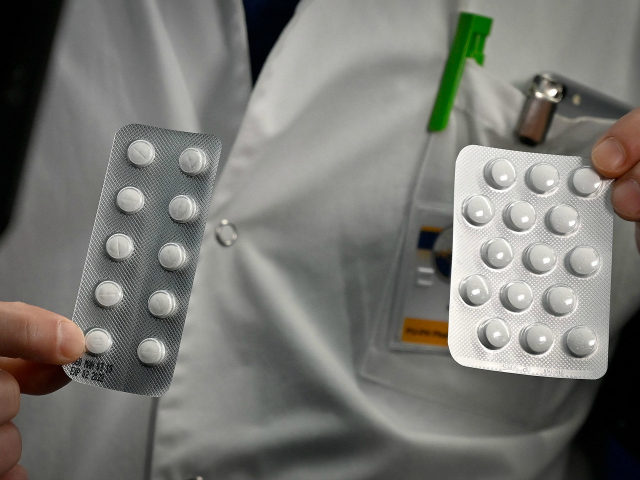The U.S. Food and Drug Administration (FDA), citing the latest science and data, rescinded its emergency use authorization (EUA) for chloroquine and hydroxychloroquine, the anti-malaria drugs touted by President Donald Trump and some doctors to combat the Chinese coronavirus.
In a statement issued Monday, the FDA, a component of the U.S. Department of Health and Human Services (HHS), announced the anti-malaria drugs “are unlikely to be effective in treating COVID-19 for the authorized uses in the EUA,” adding:
Additionally, in light of ongoing serious cardiac adverse events and other potential serious side effects, the known and potential benefits of chloroquine and hydroxychloroquine no longer outweigh the known and potential risks for the authorized use.
Based on the scientific data available at the time, FDA authorized the emergency use of the anti-malaria drugs on March 28 at the behest of the Biomedical Advanced Research and Development Authority (BARDA) within HHS.
BARDA requested that the agency put the kibosh on the emergency use authorization “based on up to date science and data.”
Dr. Anand Shah, the FDA deputy commissioner for medical and scientific affairs, declared on Monday:
We’ve made clear throughout the public health emergency that our actions will be guided by science and that our decisions may evolve as we learn more about the [novel coronavirus], review the latest data, and consider the balance of risks versus benefits of treatments for COVID-19.
FDA reportedly learned from a large randomized clinical trial involving hospitalized patients that two anti-malaria drugs “showed no benefit on mortality or in speeding recovery” of COVID-19. It said:
This outcome was consistent with other new data, including data showing that the suggested dosing regimens for chloroquine and hydroxychloroquine are unlikely to kill or inhibit the virus that causes COVID-19. The totality of scientific evidence currently available indicate a lack of benefit.
On Monday, the FDA noted that doctors may still prescribe the two drugs for off-label uses if they determine them appropriate for patients who have contracted COVID-19, the disease caused by the new coronavirus.
There is an over 90 percent chance that the much-hyped chloroquine and hydroxychloroquine can help patients afflicted by the novel coronavirus, the Association of American Physicians and Surgeons (AAPS) declared in the letter.
Clinical trials evaluating the potential benefits of chloroquine and hydroxychloroquine in fighting COVID-19, continue outside emergency use, the FDA pointed out Monday.
Dr. Patrizia Cavazzoni, the acting director of the FDA’s Center for Drug Evaluation, explained:
While additional clinical trials continue to evaluate the potential benefit of these drugs in treating or preventing COVID-19, we determined the emergency use authorization was no longer appropriate. This action was taken following a rigorous assessment by scientists in our Center for Drug Evaluation and Research.
The FDA acknowledged that the two drugs continue to be approved for the treatment and prevention of malaria as well as to combat some autoimmune conditions “in accordance with their FDA-approved labeling.”
Last month, President Trump disclosed that he was taking hydroxychloroquine daily to prevent a COVID-19 infection.
In a memo, Dr. Sean Conley, the White House physician, revealed that after discussing the drug with Trump, they concluded that “the potential benefit from treatment outweighed the relative risks.”
Based on flawed data that claimed coronavirus patients who took the drugs were dying at higher rates and experiencing other problems, the World Health Organization (W.H.O.) temporarily halted its chloroquine and hydroxychloroquine study.
At the beginning of June, however, the United Nations agency resumed its study of the anti-malaria drugs’ use against the novel “after its data safety monitoring committee found there was no increased risk of death for COVID patients taking it,” the Guardian revealed.
Currently, there are no FDA-approved drugs for the treatment of the new coronavirus.
Emergency authorization is different than formal drug approval by the FDA.
At the beginning of May, the agency granted emergency use authorization for Gilead Sciences’ remdesivir to combat COVID-19.
“Receiving remdesivir may benefit certain people in the hospital with COVID-19,” the FDA declared on May 1, warning people with certain conditions to consult with their doctor before taking the drug.

COMMENTS
Please let us know if you're having issues with commenting.